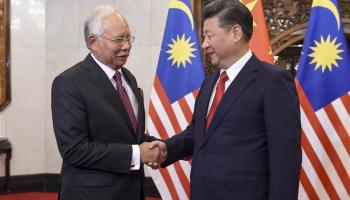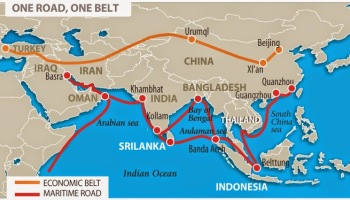It is not so much the final outcome of last week’s race as the entire democratic process that is being questioned or scrutinized in and outside the US.
In the run-up to the Nov. 8 election, spectators of American politics were served with the tale of a contest between two candidates, both with problematic backgrounds and flawed characters.
More negative revelations about the candidates emerged as the election day neared to raise serious questions about their credibility and competency of whoever is elected to lead the world’s most powerful country.
The American media had rightly if not unkindly described this as an election where voters had to choose between the lesser of two evils.
When that choice fell on Donald Trump rather than Hillary Clinton, there was more indignation, both at the outcome as well as the electoral process.
What went wrong with the system, many people asked?
Is the American electoral system failing that we should question its effectiveness and efficiency in picking national leaders? Or are we seeing signs of fatigue in the system that has evolved in the last two centuries? To describe this as a systemic breakdown of the electoral process would probably go too far, and would give pretext for countries to conveniently discard or to forget liberal democracy.
Maybe it is worth recalling that just eight years ago, the same system gave America its first black president in Barack Obama, who was reelected in 2012. This year, the same system almost produced the first US woman president.
Still, the 2016 American presidential race, from the process to the final outcome, gives plenty of ammunition to those who doubt the ability of liberal democracy in producing great leaders.
The timing could not be worse, coming as the US superpower status is waning, through a combination of its own failing strengths and the rise of China challenging America’s supremacy.
Liberal democracy a la America had its strong appeals in recent history that it seemed to be the natural or only course for any nation to go. Theories were postulated about the first wave, second wave and third wave of democracy. There may not be a fourth wave, at least not until nations are convinced that this is really the best way to move forward.
Enter the China model.
Because it is a system that has proven efficient and effective, and certainly delivered the economic goods, it is now being touted as the better option than liberal democracy for developing countries looking for the right kind of nation-building model, including in the way they pick their leaders.
One caveat about the China model, however: Forget freedom and basic rights, the fundamental tenets that underpin liberal democracy.
What matters is that the system brings economic growth and development and raises people’s prosperity. The suppression of some freedoms and rights — big or small is relative — is the price nations have to pay to ensure stability, a prerequisite to development.
Freedoms and basic rights can come later, if at all.
In The China Model — Political Meritocracy and the Limits of Democracy (2015, Princeton University Press), author Daniel A. Bell shows how China introduced a meritocratic system that has produced leaders the nation can be proud of.
The leaders that have come out of this system have consistently produced rapid growth rates that turned China from a large poor developing country to the second-largest economy in the world in these last two decades.
The system still ensures periodic changes of national guards to prevent China from becoming a dictatorship. It offers a degree of predictability to ensure stability, a factor sorely missing in liberal democracies. It is not a perfect system by any measure, but it is a model that has evolved in China out of the socialist system that the founding fathers of the People’s Republic of China launched in 1949.
But if countries are not comfortable with the costs to freedom and basic rights that the China model entails, they should probably take another look at the US democracy, and consider 2016 as an aberration rather than a system that is failing, a system that is suffering from fatigue and needing reforms.
Americans need to look at the role of the political parties and the way they produced presidential candidates. Surely a country of 320 million people deserved better choices than Trump and Clinton. How their track records and flawed characters got past the political screening system is simply baffling.
The US electoral system — including the primaries and the conventions — is simply too long and too expensive for any country to emulate. For that price, Americans should feel they are being shortchanged by the system.
This year’s voter turnout, estimated at 58 percent this year, is another reflection of the growing public apathy toward the electoral system or the candidates it produced.
The 2016 American presidential race saw the ugliest and most divisive campaigns ever seen that inevitably would leave behind a sour taste, even if Clinton gave a gallant concessionary speech.
The US election has become one big and long political show of selecting the most popular, but not necessarily the most capable candidate. One could compare it with American Idol, but even this reality TV show has been pulled out due to viewers’ fatigue.
If this is the picture of democracy, then many nations around the world would want none of it.
The US electoral system actually has built-in self-correcting mechanisms such as the two-term limits and the various institutional checks-and-balances to prevent the emergence of a despot.
The First Amendment, and the independent media, ensure that people will always have the right to speak up and to be heard, even if they have made the wrong choice.
But these may not be enough to restore the faith in liberal democracy in producing great leaders. This faith has further waned after the 2016 US presidential election. One could also throw in Brexit as another product of a democratic exercise in the Western world that has gone wrong.
In many countries, liberal democracy is no longer considered the best political system in selecting national leaders. It is not the only way forward. The China model has never been more attractive alternative in some countries, including Indonesia, still grappling with nation building.
America can help restore faith in liberal democracy by carrying out the necessary electoral reforms. It needs to show once again that democracy is the best political system in selecting leaders because it is based on the principles of respecting freedoms and basic human rights.
Yes, America can be great once again. But probably it would be asking too much from the new elected president.
By Endy Bayuni, Editor-in-chief of The Jakarta Post
Can China overtake US to lead the world?
Trump’s trade tempest
Discussions were running high on global governance among Western public opinion on the eve of the Asia Pacific Economic Cooperation (APEC) leaders meeting in Lima, Peru. Some Western media outlets hold the US is giving up its global leadership following Donald Trump's election as US president on promises to abolish the Trans-Pacific Partnership (TPP) and withdraw from the Paris climate deal. They believe a rising superpower, China, will replace the US to lead the world.
Trump's campaign remarks do reveal his intention to retract US global strategy. He seemingly wants to focus more energy and resources on reviving the US economy and social development. But as the US has been central to globalization, Trump is unlikely to take on the traditional isolationist road.
The West likes to use "leadership" to define the function of a major power. Admittedly, different countries have different powers and obligations due to varied national strength. The world after the Cold War was dominated by US leadership. Washington designed and maintained a string of systems, including the world trade system, the financial system, the Internet system, the security pattern and so on.
The US has invested much into maintaining this leadership and also gained considerable benefits. In the foreseeable future, it's impossible for the US to abandon its global leadership.
The US sought supremacy over everything in the past few years. However, it didn't have enough national strength to bolster this unrealistic goal. Trump appears to be redesigning the US leadership, withdrawing the country from fields in which he thinks resources are being wasted. China thus will gain some room to exert its influence, but is China ready?
China still cannot match the US in terms of comprehensive strength. It has no ability to lead the world in an overall way, plus, neither the world nor China is psychologically ready for it. It's beyond imagination to think that China could replace the US to lead the world.
But as China is rapidly developing, bringing about changes to the global power structure, its participation in global governance will be a natural and gradual process, which Beijing cannot rush or escape.
If Washington withdraws from the Paris climate deal, China can stick to its commitment, yet it won't be able to make up for the loss caused by the US. Or if the US takes on an anti-free trade path, the messy consequences will be beyond China's ability to repair.
But on the other hand, the US, under the leadership of Trump, cannot rope in China's neighboring countries to contain China or isolate China from the world trade system. Obama's administration had worked to undermine China-initiated projects, such as the Asian Infrastructure Investment Bank and the "One Belt and One Road" initiative, but to no avail.
So Sino-US cooperation is the only choice for future global governance. For a long time to come, the leadership of the US will be irreplaceable, meanwhile, China's further rise is inevitable.
- Global Times
 Commentary: 21st century belongs to strivers
Commentary: 21st century belongs to strivers
"The 21st century is the time for the Chinese," said the CEO of a Chinese mobile phone company at the recent launch of a new product. The CEO remarked that Western bigwigs will finally be surpassed by Chinese strivers who are determined to change their lives through hard work.
He further explained that, although some companies in developed countries are leading the world in many aspects, their bureaucracy, laziness, arrogance and ego will hinder their development.
To some extent, all Chinese people in the past 100 years are strivers who have managed to change their own fates and the fate of their country through sheer diligence; this trend is vividly illustrated by the process of reform and opening-up. After keeping their noses to the grindstone despite hardships and difficulties, Chinese people have finally succeeded in ushering in a new era.
Those who have doubted China over the years were not aware of the strivers' true personalities. The strivers desperately thirst for better lives. They are able to bear unbearable hardships and endure unendurable suffering. Such morale and pluck can never be defeated.
The struggle of a software company in Guangdong, which has grown from a small enterprise into an industry titan, offers an inspiring story. During a trip to Germany for an exhibition shortly after the company's founding, both boss and employees slept on park benches in order to save money. More importantly, none of them complained about having to do so.
In 2009, China needed to build a large exhibition area, as the guest of honor of that year’s Frankfurt Book Fair. However, shortly before the opening of the event, construction was not yet complete because of German workers' fixed schedule. Therefore, the Chinese exhibitor invited workers from China to complete the work, and that team was able to finish before the opening ceremony.
It is the effort, hard work and sweat of these strivers that have contributed to China's current development. Their willingness to struggle came from a thirst to change their fate.
In recent years, many Chinese enterprises are expanding their business in Africa. Instead of spending money on entertainment, Chinese employees there save money to make phone calls to their families back home. This priority was not received well by some locals, who believe that one should enjoy life with one’s money. As a result, people cooked up stories that Chinese employees in Africa were prisoners sent by the Chinese government. Believing these rumors, some Western media outlets even slammed China for human rights violations. Finally, a media outlet from the U.K. discovered the truth. These Chinese workers are just the same as their Western counterparts: they love their families and hope to change their lives through hard work. They consider it their life purpose to improve the quality of life of their families, especially their children. The U.K. outlet ultimately concluded that the unyielding spirit of Chinese people is unrivalled, and they will certainly change the world.
Hard work pays. This is the basis for social function. Any society will collapse without such faith.
China is no longer the impoverished country it was 30 years ago. Even so, the enterprising spirit of its citizens has endured. The country needs to stay confident, especially during the “new normal” of slower economic growth. As long as its people have the faith to change fate through hard work, they should fear no difficulty.
One dare not say that the 21st century is destined to be the era of China, but it certainly belongs to the strivers who are determined to change their lives through work.
This article was edited and translated from 21世纪属于渴望奋斗改变命运的"泥腿子"
Source: People's Daily
Related:
Hopefully death knell for TPP signals US is about to change tack
Related posts:














 Movers and shakers: Dr Wee (centre) flanked by former Taiwan President Ma Ying-jeou (Wee’s right) and WCES founder and patron and Country Heights Group of Companies founder Tan Sri Lee Kim Yew cutting ribbons at the opening ceremony of the 8th WCES in Malacca. Also joining them are (from left) WCES co-chairmain Datuk Seri David Yeat, Asli CEO Tan Sri Michael Yeoh, Asli and Sunway Group chairman Tan Sri Jeffrey Cheah, Plantation Industries and Commodities Minister Datuk Seri Mah Siew Keong, former Indonesian President Susilo Bambang Yudhoyono, Malacca Chief Minister Datuk Seri Idris Haron, former Australian Prime Minister Kevin Rudd, former Pakistani Prime Minister Shaukat Aziz, former Thai Deputy Prime Minister Dr Surakiart Sathirathai, Quest International University Perak chief operating officer Nicholas Goh, Mah Sing Group marketing and innovation general manager Lily Lee and Star Media Group Bhd editor-in-chief Datuk Leanne Goh.
Movers and shakers: Dr Wee (centre) flanked by former Taiwan President Ma Ying-jeou (Wee’s right) and WCES founder and patron and Country Heights Group of Companies founder Tan Sri Lee Kim Yew cutting ribbons at the opening ceremony of the 8th WCES in Malacca. Also joining them are (from left) WCES co-chairmain Datuk Seri David Yeat, Asli CEO Tan Sri Michael Yeoh, Asli and Sunway Group chairman Tan Sri Jeffrey Cheah, Plantation Industries and Commodities Minister Datuk Seri Mah Siew Keong, former Indonesian President Susilo Bambang Yudhoyono, Malacca Chief Minister Datuk Seri Idris Haron, former Australian Prime Minister Kevin Rudd, former Pakistani Prime Minister Shaukat Aziz, former Thai Deputy Prime Minister Dr Surakiart Sathirathai, Quest International University Perak chief operating officer Nicholas Goh, Mah Sing Group marketing and innovation general manager Lily Lee and Star Media Group Bhd editor-in-chief Datuk Leanne Goh.







 That is what is sorely needed to improve MCA’s chances of winning back the Chinese vote in the next general election, which is Najib’s ultimate challenge to the party.
That is what is sorely needed to improve MCA’s chances of winning back the Chinese vote in the next general election, which is Najib’s ultimate challenge to the party.
